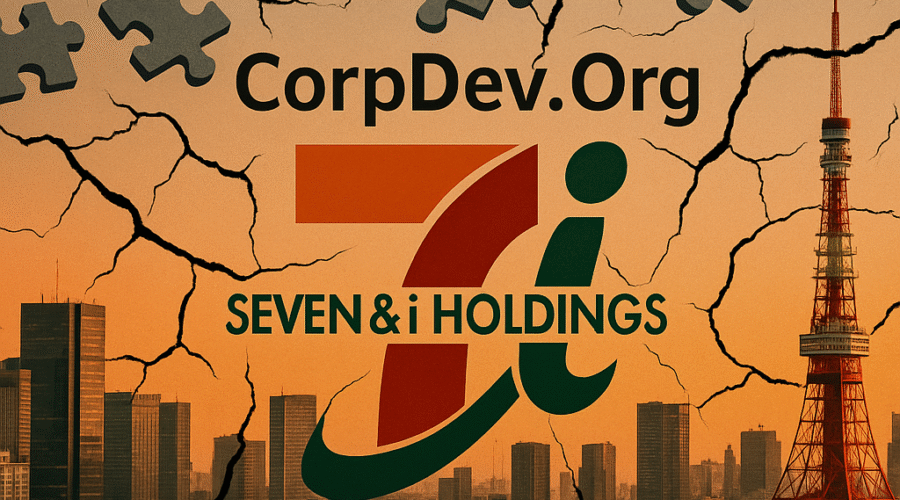The abrupt termination of Alimentation Couche-Tard’s $46 billion acquisition bid for Seven & i Holdings represents a watershed moment in global M&A, exposing persistent structural barriers to foreign investment in Japan despite corporate governance reforms. The collapsed deal—which would have been the largest foreign takeover of a Japanese company—triggered an immediate 8-10% stock plunge in Seven & i shares as markets priced in diminished prospects for shareholder value realization. Couche-Tard’s public accusations of “calculated obfuscation” by Seven & i management[1][3][16], juxtaposed with the target’s defense of its standalone strategy, reveals fundamental tensions between international capital and Japan’s corporate establishment that will reshape cross-border investment theses across Asia-Pacific.
💼 M&A / PE diligence in 24 hours? Yes, thanks to AI!
Deal Architecture and Breakdown Dynamics
Strategic Rationale and Offer Evolution
The proposed merger promised to create a global convenience retail powerhouse spanning 104,000 stores across 29 countries, combining Couche-Tard’s Circle K network with Seven & i’s dominant 7-Eleven franchise. Initial discussions dating to the early 2000s culminated in a formal $39 billion offer in 2024, rejected by Seven & i as “grossly undervaluing” the company[16]. By January 2025, Couche-Tard increased the bid to ¥6.77 trillion ($46 billion), representing a 32% premium to pre-offer trading levels[1][3]. The revised structure accommodated Seven & i’s request for yen-denominated terms and included alternative proposals: acquiring only international operations or taking minority stakes in specific divisions[3][17]. This flexibility reflected Couche-Tard’s assessment that full integration would generate $3.2 billion in annual synergies through supply chain optimization and private label expansion[16].
Due Diligence Breakdown
Despite executing a non-disclosure agreement in April 2025, Couche-Tard reported receiving “minimal or already publicly available” information during due diligence[1][3]. Critical data requests regarding franchisee relationships and supply chain operations went unanswered, while management meetings were characterized as “superficial and tightly scripted”[17]. In one Dallas meeting documented in Couche-Tard’s termination letter, CEO Stephen Dacus interrupted an executive attempting to answer licensing questions by “pointing to his head as if to remind his colleague to ‘think'”[1][3]. The buyer also cited Seven & i’s failure to share necessary documentation with potential divestiture targets for 2,000 North American stores—a key antitrust mitigation measure[1][17]. These operational roadblocks compounded regulatory concerns, including Japan’s Ministry of Economy citing “national security” implications due to 7-Eleven’s role in disaster relief infrastructure[8][18].
Defensive Maneuvers and Shareholder Value Implications
Seven & i’s Poison Pill Strategy
Facing shareholder pressure after Couche-Tard’s initial approach, Seven & i deployed a multi-pronged defense: appointing retail veteran Stephen Dacus as CEO, accelerating the $5.4 billion sale of its superstore division, announcing a record ¥2 trillion ($13.5 billion) share buyback, and proposing a U.S. IPO for its North American convenience business[1][3][4]. These measures lifted shares 25% above pre-offer levels, creating valuation headwinds for the suitor[1]. However, the abrupt deal collapse erased $3.8 billion in market capitalization within hours of trading resumption on July 17[2][5], exposing the fragility of standalone plans. Bloomberg Intelligence analyst Lea El-Hage notes: “The August strategy update becomes existential for management credibility—they must now demonstrate standalone value exceeding the rejected premium”[1][3].
IPO Doubts and Governance Paradox
The planned U.S. listing of 7-Eleven Inc.—potentially the largest retail IPO of 2026 with a projected $40 billion valuation[4]—now faces skepticism. Aizawa Securities fund manager Ikuo Mitsui contends: “With the takeover threat gone, retaining 100% ownership of this crown jewel better serves corporate value”[4]. This exposes a governance paradox: defensive measures deployed to preserve independence may ultimately deprive shareholders of value-unlocking opportunities. The episode highlights how Japan’s traditional stakeholder model continues to prioritize corporate continuity over shareholder returns, despite 2015’s stewardship code reforms. Ortus Advisors’ Andrew Jackson observes: “The moat of Japanese protectionism proved too deep—this was always improbable given Seven & i’s status as a national champion”[1][3].
Cross-Border M&A Structural Barriers
Cultural and Regulatory Hurdles
The failed transaction underscores enduring challenges in Japan’s M&A ecosystem. Cultural resistance manifested in what Couche-Tard termed “lack of sincere engagement,” reflecting management’s reluctance to cede control of a culturally iconic brand[1][17]. Regulatory friction emerged through unaddressed antitrust concerns—particularly in the U.S. where both operators hold dominant shares in key markets—and Japan’s invocation of national security considerations[8][18]. These structural barriers persist despite 2024 revisions to Japan’s Corporate Governance Code encouraging greater board independence and shareholder dialogue. The outcome validates skepticism that governance reforms remain more cosmetic than substantive in protecting domestic enterprises.
Comparative Deal Analysis
This collapse mirrors other failed cross-border bids in Japan, including Takeda Pharmaceutical’s abandoned $60 billion pursuit of Shire in 2018 and Bain Capital’s thwarted acquisition of Toshiba Memory in 2017. Common factors include:
| Deal | Value | Failure Catalyst |
|---|---|---|
| Couche-Tard/7&i (2025) | $46B | Management resistance, regulatory concerns |
| Takeda/Shire (2018) | $60B | Shareholder opposition, integration risks |
| Bain/Toshiba Memory (2017) | $18B | Government intervention, antitrust issues |
The pattern suggests foreign acquirers must overcome not just financial hurdles but deeply embedded institutional defenses. As CNBC’s Martin Soong observed during market reaction: “This was less about valuation than cultural DNA—the Itō family simply couldn’t stomach foreign control of their keiretsu jewel”[8].
Sector Implications and Competitive Realignment
Global Convenience Retail Fragmentation
The deal’s collapse preserves the tripartite global convenience landscape: Seven & i’s Asian dominance (22,000 Japan stores), Couche-Tard’s Americas/European footprint, and Sinopec’s 30,000 Chinese locations. Without consolidation, margin pressures may intensify as regional players face rising labor costs and supply chain inflation. Seven & i’s 3.2% operating margin trails Couche-Tard’s 7.1%, highlighting efficiency gaps that the merger sought to address[16]. Competitors like FamilyMart now face reduced pressure to pursue defensive mergers, potentially slowing industry-wide consolidation. However, private equity may target smaller regional chains like Casey’s or Alimentation as alternative platforms.
Activist Investor Calculus
The outcome complicates activist strategies in Japan. While ValueAct Capital succeeded in securing board seats at Seven & i in 2022, the collapsed deal demonstrates limits to shareholder influence over strategic decisions. Funds must now weigh the $3.8 billion immediate value destruction against potential long-term gains from the standalone plan. This may accelerate a pivot toward smaller-cap targets where governance resistance is less entrenched. The Tokyo Stock Exchange’s push for higher price-to-book ratios could create new opportunities, but the Seven & i precedent suggests established conglomerates retain formidable defenses.
Conclusion: Inflection Point for Japan Inc.
Couche-Tard’s abandoned bid represents more than a failed transaction—it signals structural limitations in Japan’s corporate governance evolution. Despite shareholder-friendly measures like buybacks and divestitures, Seven & i’s resistance to engagement reveals persistent insularity at odds with global capital expectations. For foreign acquirers, the lesson is clear: even 32% premiums cannot overcome cultural and institutional barriers without management buy-in. The impending August strategy update from Seven & i becomes a referendum on whether Japan’s corporate champions can generate organic value matching what international capital offers. Should execution falter, pressure for genuine governance reform may finally overcome tradition. Meanwhile, global investors must recalibrate Japan allocations with heightened sensitivity to these structural constraints, potentially shifting focus to sectors with lower cultural barriers like technology and renewable energy.
Sources
https://theedgemalaysia.com/node/762938, https://www.morningstar.com/news/dow-jones/202507169656/seven-i-shares-slump-after-couche-tard-abandons-47-billion-bid, https://www.business-standard.com/world-news/canada-couche-tard-abandons-46-billion-bid-to-buy-7-eleven-owner-125071700164_1.html, https://theedgemalaysia.com/node/762996, https://www.tradingview.com/news/invezz:2f25409fd094b:0-couche-tard-exit-lets-seven-i-refocus-on-core-ops-but-stock-may-stay-muted/, https://finimize.com/content/couche-tard-walks-away-from-seven-i-takeover-bid, https://www.tipranks.com/news/ma-news-7-eleven-owner-seven-i-stock-falls-after-couche-tard-walks-away-from-46b-bid, https://www.youtube.com/watch?v=eNq52l2aKfs, https://www.tipranks.com/news/company-announcements/pacific-edge-limited-announces-proposed-securities-issue, https://www.tipranks.com/news/company-announcements/hasi-subsidiaries-complete-cash-tender-offers, https://www.tipranks.com/news/company-announcements/badger-infrastructure-solutions-to-announce-q2-2025-financial-results, https://www.tipranks.com/news/company-announcements/stellantis-halts-hydrogen-fuel-cell-program-amid-market-challenges, https://www.tipranks.com/news/company-announcements/upexi-completes-50m-private-placement-offering, https://www.tipranks.com/news/company-announcements/fbim-acquires-substantial-stake-in-tower-limited, https://www.tipranks.com/news/company-announcements/haranga-resources-nears-completion-of-lincoln-gold-project-acquisition-3, https://www.tipranks.com/news/company-announcements/sandvik-ab-reports-stable-q2-2025-performance-amid-challenges, https://www.morningstar.com/news/dow-jones/202507169354/alimentation-couche-tard-ends-bid-to-buy-seven-i-holdings-2nd-update, https://www.youtube.com/watch?v=TMtFMENXtz8





